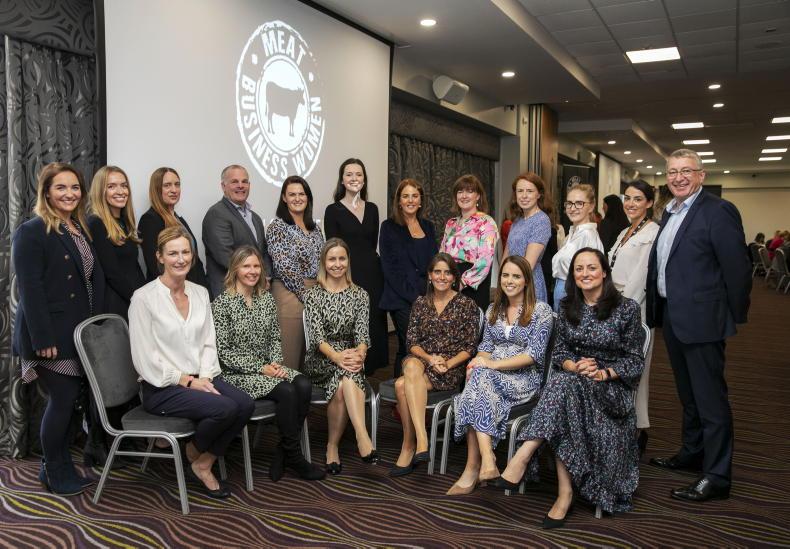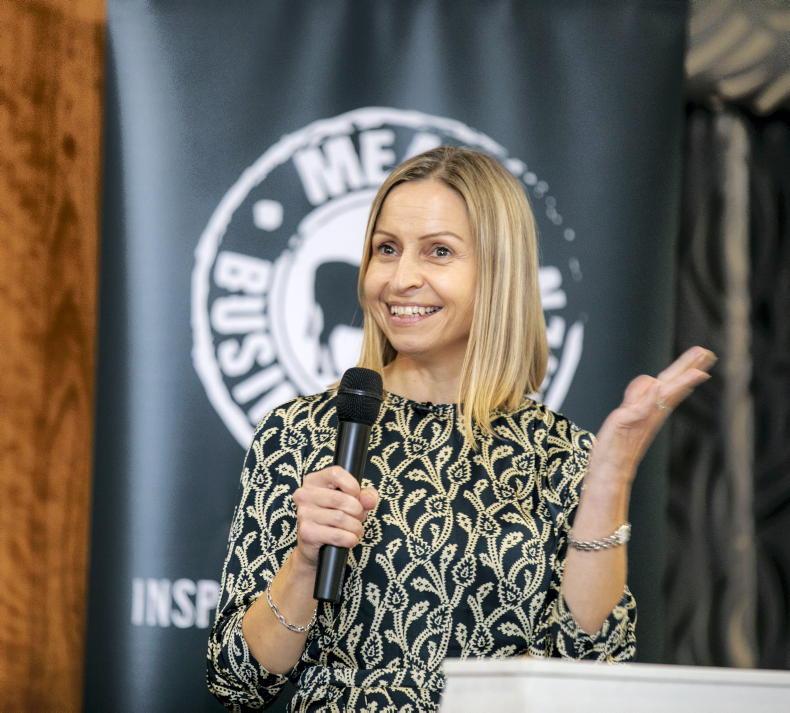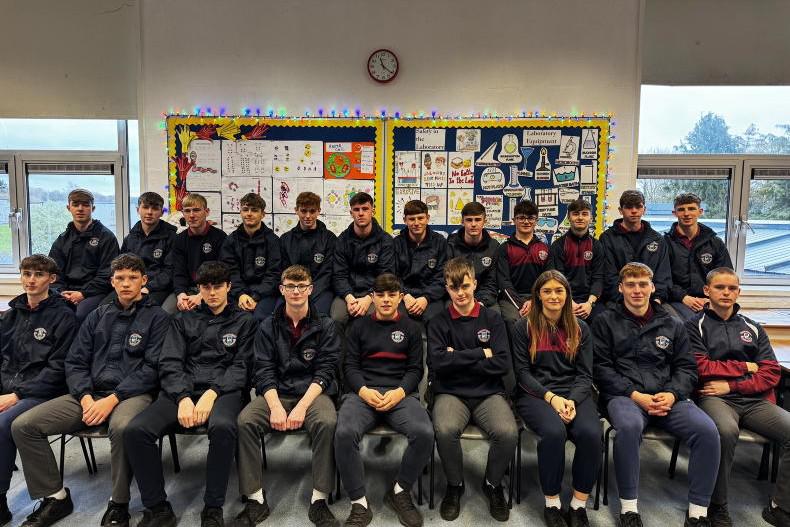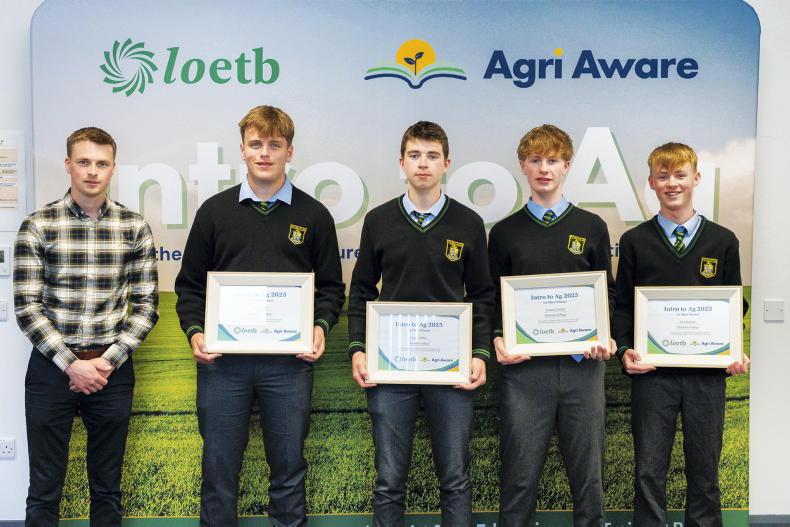With no agricultural background, Sorcha Donnelly worked her way up the ladder at Kepak. She joined the Irish-based food company’s graduate programme and took on a number of roles before becoming head of commercial projects and people.
Getting a foot in the door
After graduating with a BA in European Studies from Trinity, majoring in Italian, Sorcha spent a year studying in Italy before looking for jobs with food companies.
She tells Irish Country Living, “At the time, Kepak was developing its sales in export markets. Italy was one of the biggest markets at the time for growth. It just happened - there was timing to it.”
She decided to apply to their graduate programme.
“I wasn’t sure I was going to get the job - or that I was fully qualified for it,” she says.
“They say women don’t often apply to roles unless they have 100% of the qualifications [required] for the role. When I look back now on my own experience I realise if I had taken that view perhaps I wouldn’t have applied for the position in Kepak. I would really encourage everyone to think about this and believe in themselves.”
Reflecting on the sector’s gender divide, Sorcha says, “I wasn’t thinking about it at the time, but even from the point of view of females in the industry, when I joined it would have been very male-dominated.”
Most people joining Kepak have an agribusiness or ag science background. But Sorcha was undeterred. “I was completely new to it so there was a lot to learn, but it was really exciting,” she says.
International Business
Initially, Sorcha worked on Italian export sales. But keen to expand her knowledge, she returned to Trinity and did a master’s degree in International Business - while continuing to work full time. The effort was worth it, she says, as it helped advance her career. “It broadened my network and gave me more confidence in speaking the language of business and finance,” she recalls.
“I wanted to do a master’s but I didn’t want to do one straight after college, I really wanted to get that work experience first and understand what direction I wanted to go into.”
After spending 15 years managing export sales and other projects, Sorcha was appointed account director. She enjoyed developing products and seeing them on the shelf in her local supermarket. Later, as Kepak’s commercial director, she was responsible for developing and implementing a business strategy for the company’s red meat division.

Sorcha Donnelly speaking at a Meat Business Women event in September
People development
In her new role, Sorcha will concentrate on strategic projects and development, including diversity.
“Personal development is very close to my heart,” she says. “I have spent a lot of time mentoring others. Realising the importance of people in our business - looking after them and developing and engaging with people - is what’s important to us as a business.”
Kepak has introduced a return-to-work after maternity leave policy and is launching a menopause initiative to support female employees and their partners and families. Sorcha says, “It’s about creating awareness and supporting our employees in their career and life journey.
“I think [these policies are] hugely progressive. It’s something we might not have talked about three or four years ago.”
Meat Business Women
In November 2021 Sorcha was appointed as the first female on the Bord Bia Meat & Livestock Board.
She says, “It was really positive for me to get to that level. I am a firm believer in ‘If she can’t see it; she can’t be it.’ The more female role models we have out there, the more we can encourage others to follow in the same pathway.”
Sorcha also works with Meat Business Women, a membership organisation that connects women working in every role across the global meat industry. Sorcha says, “We don’t want to focus on one particular gender, but we want to make it an inclusive place to work for all.
“It is an area that is very close to my heart in terms of having been that female coming into the industry over 20 years ago - and now seeing the industry as it is today.”
Work-life balance
Sorcha is also a parent to two children, 14 and 11. Acknowledging the challenges for working parents, Sorcha says that it has gotten easier as they get older and “I’m fortunate Kepak is a flexible employer.’
Indeed, Kepak now allows employees in some roles to work two days at home and three in the office.
About Kepak
An Irish-based company serving international markets, restaurants and household foodservice names with prime cuts of meat, food service solutions and ready-for-market convenience foods.
As a woman working in a male-dominated industry, Sorcha has been involved in mentoring and improving diversity and inclusion within the company.
Opportunities as a sector
Having a keen interest in mentoring, Sorcha has spoken to a number of graduates and undergraduates about the opportunities in the agri-food sector.
“Opening people’s eyes to what we offer as an industry is really important,” she says. “There is so much diversity, so much going on and so much opportunity. We have been in growth as one of the largest indigenous industries in the country and it really offers a lot.”
Sorcha is keen to encourage women to enter the industry. “From my own experience I have never felt gender an obstacle,” she says.
Most of her mentors over the years were men, and she was always urged to put herself forward for new roles.
She says, “Gone are the days you remained in the same role forever. I think it is about understanding your career is a journey, not a destination.”
When considering prospective employers (whatever the industry), she says people should look at the company’s values and ensure they match your own.
“When those values align it makes for a positive working environment,” says Sorcha.
As a mentor, Sorcha has spoken to a number of graduates and undergraduates about opportunities in the agri-food sector.
“Opening people’s eyes to what we offer as an industry is really important,” she says. “There is so much diversity, so much going on and so much opportunity.”
Read more
Career profile: Thia Hennessy, Dean of Cork University Business School
Dundalk students host inspiring women in business event
With no agricultural background, Sorcha Donnelly worked her way up the ladder at Kepak. She joined the Irish-based food company’s graduate programme and took on a number of roles before becoming head of commercial projects and people.
Getting a foot in the door
After graduating with a BA in European Studies from Trinity, majoring in Italian, Sorcha spent a year studying in Italy before looking for jobs with food companies.
She tells Irish Country Living, “At the time, Kepak was developing its sales in export markets. Italy was one of the biggest markets at the time for growth. It just happened - there was timing to it.”
She decided to apply to their graduate programme.
“I wasn’t sure I was going to get the job - or that I was fully qualified for it,” she says.
“They say women don’t often apply to roles unless they have 100% of the qualifications [required] for the role. When I look back now on my own experience I realise if I had taken that view perhaps I wouldn’t have applied for the position in Kepak. I would really encourage everyone to think about this and believe in themselves.”
Reflecting on the sector’s gender divide, Sorcha says, “I wasn’t thinking about it at the time, but even from the point of view of females in the industry, when I joined it would have been very male-dominated.”
Most people joining Kepak have an agribusiness or ag science background. But Sorcha was undeterred. “I was completely new to it so there was a lot to learn, but it was really exciting,” she says.
International Business
Initially, Sorcha worked on Italian export sales. But keen to expand her knowledge, she returned to Trinity and did a master’s degree in International Business - while continuing to work full time. The effort was worth it, she says, as it helped advance her career. “It broadened my network and gave me more confidence in speaking the language of business and finance,” she recalls.
“I wanted to do a master’s but I didn’t want to do one straight after college, I really wanted to get that work experience first and understand what direction I wanted to go into.”
After spending 15 years managing export sales and other projects, Sorcha was appointed account director. She enjoyed developing products and seeing them on the shelf in her local supermarket. Later, as Kepak’s commercial director, she was responsible for developing and implementing a business strategy for the company’s red meat division.

Sorcha Donnelly speaking at a Meat Business Women event in September
People development
In her new role, Sorcha will concentrate on strategic projects and development, including diversity.
“Personal development is very close to my heart,” she says. “I have spent a lot of time mentoring others. Realising the importance of people in our business - looking after them and developing and engaging with people - is what’s important to us as a business.”
Kepak has introduced a return-to-work after maternity leave policy and is launching a menopause initiative to support female employees and their partners and families. Sorcha says, “It’s about creating awareness and supporting our employees in their career and life journey.
“I think [these policies are] hugely progressive. It’s something we might not have talked about three or four years ago.”
Meat Business Women
In November 2021 Sorcha was appointed as the first female on the Bord Bia Meat & Livestock Board.
She says, “It was really positive for me to get to that level. I am a firm believer in ‘If she can’t see it; she can’t be it.’ The more female role models we have out there, the more we can encourage others to follow in the same pathway.”
Sorcha also works with Meat Business Women, a membership organisation that connects women working in every role across the global meat industry. Sorcha says, “We don’t want to focus on one particular gender, but we want to make it an inclusive place to work for all.
“It is an area that is very close to my heart in terms of having been that female coming into the industry over 20 years ago - and now seeing the industry as it is today.”
Work-life balance
Sorcha is also a parent to two children, 14 and 11. Acknowledging the challenges for working parents, Sorcha says that it has gotten easier as they get older and “I’m fortunate Kepak is a flexible employer.’
Indeed, Kepak now allows employees in some roles to work two days at home and three in the office.
About Kepak
An Irish-based company serving international markets, restaurants and household foodservice names with prime cuts of meat, food service solutions and ready-for-market convenience foods.
As a woman working in a male-dominated industry, Sorcha has been involved in mentoring and improving diversity and inclusion within the company.
Opportunities as a sector
Having a keen interest in mentoring, Sorcha has spoken to a number of graduates and undergraduates about the opportunities in the agri-food sector.
“Opening people’s eyes to what we offer as an industry is really important,” she says. “There is so much diversity, so much going on and so much opportunity. We have been in growth as one of the largest indigenous industries in the country and it really offers a lot.”
Sorcha is keen to encourage women to enter the industry. “From my own experience I have never felt gender an obstacle,” she says.
Most of her mentors over the years were men, and she was always urged to put herself forward for new roles.
She says, “Gone are the days you remained in the same role forever. I think it is about understanding your career is a journey, not a destination.”
When considering prospective employers (whatever the industry), she says people should look at the company’s values and ensure they match your own.
“When those values align it makes for a positive working environment,” says Sorcha.
As a mentor, Sorcha has spoken to a number of graduates and undergraduates about opportunities in the agri-food sector.
“Opening people’s eyes to what we offer as an industry is really important,” she says. “There is so much diversity, so much going on and so much opportunity.”
Read more
Career profile: Thia Hennessy, Dean of Cork University Business School
Dundalk students host inspiring women in business event











SHARING OPTIONS